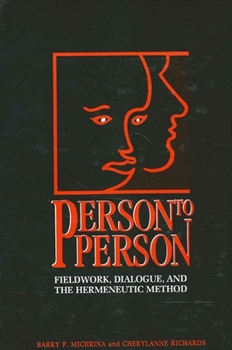Person to Person: Fieldwork, Dialogue, and the Hermeneutic Method
Select Format
Select Condition 
Book Overview
Guides students through the step-by-step procedure of qualitative social research using the dialogical hermeneutic method of analysis.
Format:Paperback
Language:English
ISBN:0791428346
ISBN13:9780791428344
Release Date:March 1996
Publisher:State University of New York Press
Length:188 Pages
Weight:0.70 lbs.
Dimensions:0.5" x 6.1" x 9.2"
Customer Reviews
1 rating
Dialogical Hermeneutics, Implications of a Humanistic Method
Published by Thriftbooks.com User , 23 years ago
Michrina and Richards set out to describe and teach a qualitative research method for ethnographic fieldwork written in language for an undergraduate student. This method stands along side other rigorous research methods, such as the scientific, experimental approach, in terms of providing a structured and systematic tool for the researcher to gain a better understanding of a group or subculture of people. They aim to take advanced concepts from the fields of Cultural Anthropology and Philosophy, two fields not known for their use of everyday language and concepts, and write a fieldwork manual in terms that makes sense to a person without an advanced degree or understanding. After reading the book twice, once for an undergraduate research methods class, and again as a secondary source for graduate school, I believe they have accomplished their goal. Person to Person takes the reader into the world of epistemology, demonstrating the different ways of knowing as described through analysis of bias, power, and validation. The authors start the book with a dialogue between a humanist and a scientist (which seems fitting considering the book's focus on dialogue) and thereby introduce the reader to the fundamental differences between the scientific and humanistic paradigms. They focus on issues of power and bias, empathy and trust, transference and counter transference, all the while emphasizing the importance of the relationship between fieldworker and informant. To better grasp the dialogical hermeneutic method, Michrina and Richards have created exercises after each chapter to help the reader practice what she has learned as well as to take an abstract method and concretely situate it into life. They write about the method in clear detail as well as demonstrate it with diagrams. This gives the reader a solid form to refer back to as she progresses into the inevitable complexities of research. Most importantly, Michrina and Richards communicate the importance of the ethical in humanistic research. Not only must a researcher maintain an ethical stance, she must be in constant reflection concerning her place in the research and methods she uses. Humanistic research is ambiguous in that the researcher is gathering information from human beings. This research does not take place in a laboratory; it takes place in life. The sought after data may be something very private and personal or well known and shared. In describing the importance of the ethical, Michrina and Richards use the Kantian ethic to give the reader an idea of what it means to be ethical. They demonstrate that the researcher should regard the informant as an end in her own right rather than a means to an end. In this way, they communicate the importance of respect and sensitivity in humanistic research. I recommend Person to Person to anyone who is studying psychology or cultural anthropology. I especially recommend this book to anyone working in the human service field. It is invaluable i





